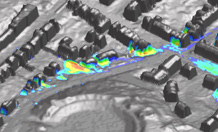
Two Engineering and Physical Sciences Research Council (EPSRC) Centres for Doctoral Training will be established at the University.
Funding boost to train tomorrow’s engineers and scientists
The University of Exeter is among 24 UK universities that will receive £350 million to train tomorrow’s engineers and scientists. Two Centres for Doctoral Training (CDTs) will be established at the University to provide postgraduate programmes in water engineering and metamaterials - artificial materials that have properties beyond those found in nature.
The centres will establish a training environment with industrial involvement at their heart, in which industry plays a key role in both management and delivery.
The £350 million funding, targeted at areas vital to economic growth, has been allocated by the Engineering and Physical Sciences Research Council (EPSRC). This is the UK's largest investment in post graduate training in engineering and physical sciences. It will be used to train over 3,500 post graduate students in engineering and physical sciences in seventy new CDTs, spread across 24 UK universities.
The Water Informatics: Science and Engineering (WISE) CDT will build on existing links with our GW4 partners, the Universities of Bristol, Bath and Cardiff, to foster new levels of innovation and collaboration to train a cohort of engineers and scientists at the boundary of water informatics, science and engineering.
Professor Dragan Savic, Co-Director of the Centre for Water Systems and Head of Engineering at the University of Exeter said: “Management of the water cycle, which is a system characterised by inherent complexity, variation, non-stationarity and uncertainty, has already gained from advances in computing, ICT and hydroinformatics. For the UK to take full advantage of leading-edge technologies we need to develop scientists and engineers capable of working at the interface of traditionally separate informatics, science and engineering disciplines to manage the water cycle effectively.”
Metamaterials are emerging as an important new class of materials with applications in many technology areas, from energy harvesting, to creating a perfect lens for imaging, to the much-hyped ‘cloaking’. The PhD students in this Exeter-based CDT will research a wide range of metastructures spanning ten orders of scale, from atomic, (graphene), through nano-scale, to control electron spin (spintronics) and light (plasmonics), up to the metre scale (radio antennas). Industrial and government laboratory involvement (providing an additional 50% of the EPSRC funding) is integral, ensuring cohort training relevant for today’s high tech industries.
Professor Roy Sambles, from Physics and Astronomy said: “To be selected by rigorous peer review to provide a training and research environment to inspire our ablest young people is fantastic. It recognises the quality of the research work we undertake here in Physical and Engineering Sciences at Exeter while also endorsing the view, held by our industrial collaborators, that we provide an excellent skill-based training for these researchers, making them well suited to work within modern high tech industry. The UK needs to play a lead role in this area and the CDT provides Exeter with a great opportunity to do just that.”
Science Minister David Willetts said: “Scientists and engineers are vital to our economy and society. It is their talent and imagination, as well as their knowledge and skills, that inspire innovation and drive growth across a range of sectors, from manufacturing to financial services.
“I am particularly pleased to see strong partnerships between universities, industry and business among the new centres announced today. This type of collaboration is a key element of our industrial strategy and will continue to keep us at the forefront of the global science race.”
Paul Golby, EPSRC’s Chair, said: “Centres for Doctoral Training have already proved to be a great success and the model is popular with students, business and industry. These new centres will give the country the highly trained scientists and engineers it needs and they will be equipped with skills to move on in their careers. The standard of applications for Centres was very high and more could have been funded if we had the capacity.”
Date: 21 November 2013
